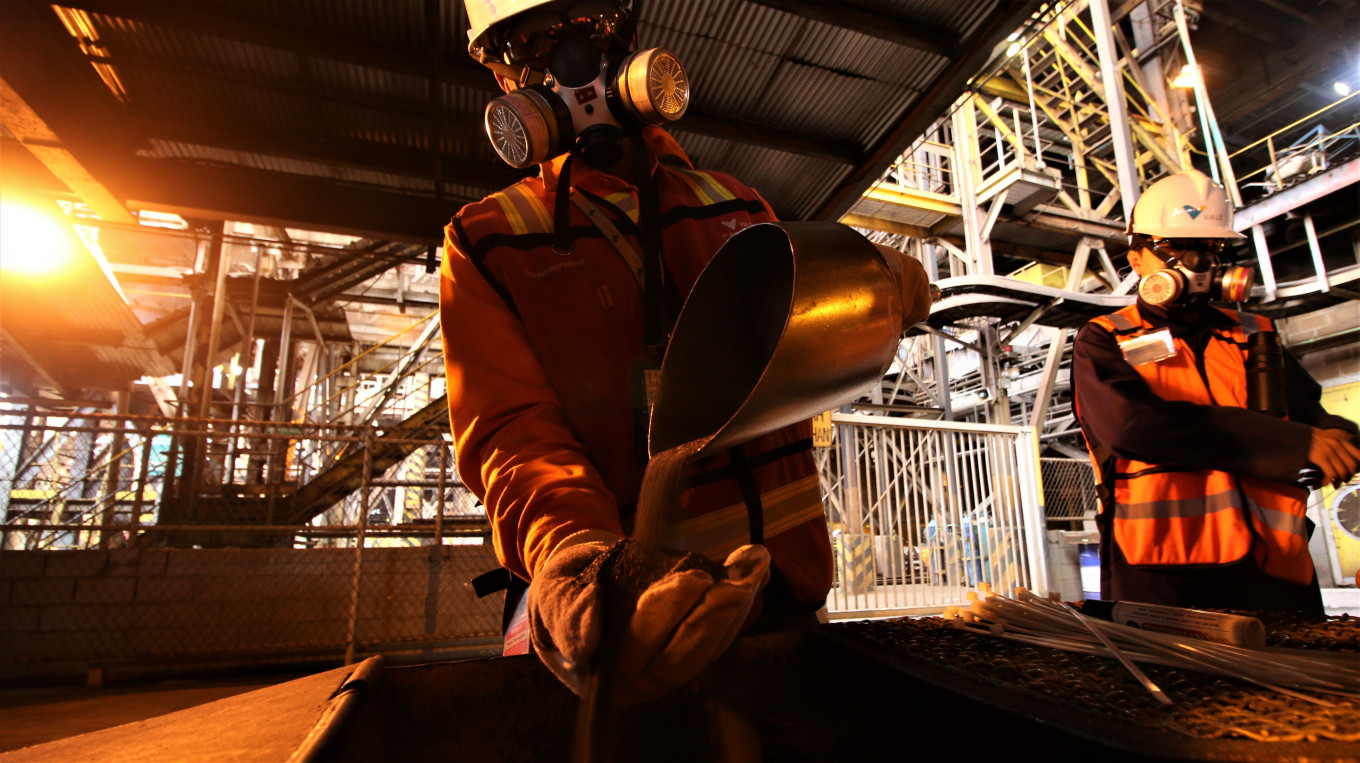Govt plans to ‘counterattack’ US, EU mineral policies
Investment Minister Bahlil Lahadalia told reporters on Friday that Indonesia planned to require 60 to 70 percent of mineral output to be processed in-country before being exported.
Change text size
Gift Premium Articles
to Anyone

T
he government has said it will seek to counter policies from the United States and European Union meant to encourage the domestic processing of minerals crucial for the electric vehicle (EV) industry, which Jakarta says could threaten the development of its own downstream metals industry.
Investment Minister Bahlil Lahadalia told reporters on Friday that Indonesia planned to require 60 to 70 percent of mineral output to be processed in-country before being exported. Increased export taxes would be applied to shipments below that threshold.
In the EV supply chain, the government aims to export nickel only if it has been processed into cathode, an intermediate product a few steps from becoming part of a battery, Bahlil said, adding that the final manufacturing steps could be done at the export destination.
“Under such a situation, Indonesia will make a counterattack,” Bahlil said of the US and EU’s mineral policies.
“We can’t be tricked. It must be fair,” he added.
Bahlil’s statements were in response to the Inflation Reduction Act (IRA) passed by the US and the Critical Raw Materials Act (CRM) proposed by the EU, which both aim to move the processing of critical minerals and the manufacture of EVs within their borders.
The US’s IRA provides up to US$7,500 in subsidies for EVs that contain a certain percentage of critical minerals processed in the US and battery components manufactured or assembled in North America.
EVs made with imported minerals and components may also qualify for the subsidies, but only if they are sourced from countries that have free trade agreements (FTAs) with the US.
Meanwhile, the EU’s CRM seeks to ensure that the bloc processes within its own borders at least 40 percent of the raw materials used in its EV market, the New York Times has reported.
The proposed EU legislation also aims to ensure battery cells are produced near the EU’s electric vehicle factories, according to the Investment Ministry.
Bahlil said the government was negotiating with the US to ensure that EVs made with Indonesian components qualified for the IRA subsidy, but he maintained that even without a deal, Indonesia could benefit from building a downstream metals industry.
He cited a $500 million deal with a US solar panel firm whereby 70 percent of the production process would take place in Indonesia before the intermediate goods were exported to the US.
“They will finish the product in the US, but that’s not a problem at all,” Bahlil said.
The United States Embassy in Jakarta did not immediately respond to a request for comment, while European Union representatives in Jakarta declined to comment.
On June 25, the International Monetary Fund (IMF) released a statement advising Indonesia to phase out its nickel export ban and refrain from expanding it to other minerals, citing concerns about prolonged high commodity prices as a result of trade disruptions.
Bahlil responded to the request by saying, “That’s your problem. If our country gets damaged [by failing to develop a downstream minerals industry], do they care about that?”
Ahmad Zuhdi Dwi Kusuma, a mining sector expert at government-owned lender Bank Mandiri, told The Jakarta Post on Saturday that the West’s mineral policies could be detrimental to countries without the right trade agreements.
He expected the prices for downstream products in countries without trade agreements with the US or EU to fall, as producers would prefer those that qualified for consumer subsidies.
“It could turn into discrimination against Indonesian downstream mineral products,” Zuhdi said.
He felt the government’s approach to the problem was “measured and well planned” but said its success would ultimately depend on whether Indonesia could secure a limited FTA with either the US or the EU, which could be challenging because of the significant Chinese presence in Indonesia’s downstream metals industry.
However, Zuhdi believed Indonesia had some bargaining power because of its position as one of the world’s top producers of critical EV minerals.
Rizal Kasli, who chairs the Association of Indonesian Mining Professionals (PERHAPI), told the Post on Sunday that Indonesia would likely have to continue exporting raw or only partially processed minerals for some time because of its limited industrial capacity.
But he warned that such exports could discourage foreign investment in the sector, as investors could take them as a signal that the government was not fully committed to developing the downstream industry.
Should a need arise, he said, the government could impose a domestic market obligation (DMO) to ensure an adequate supply of critical minerals in the country.









